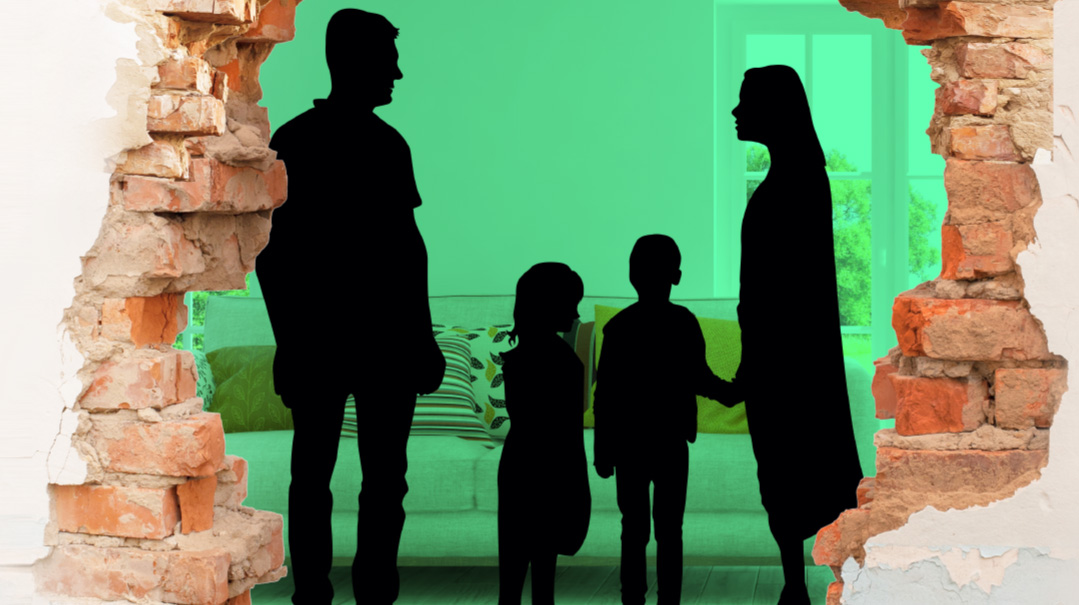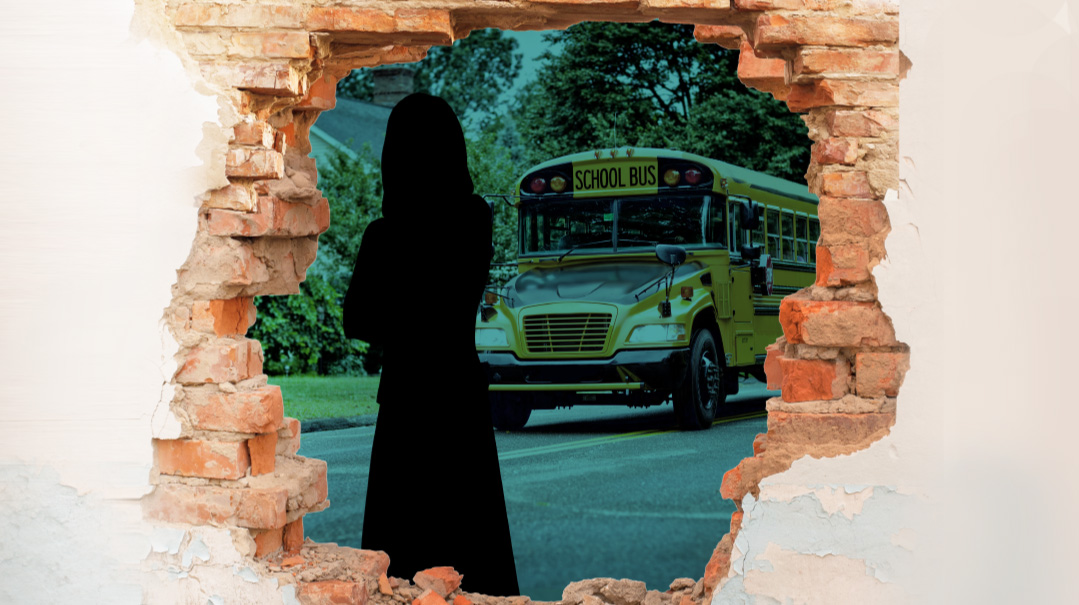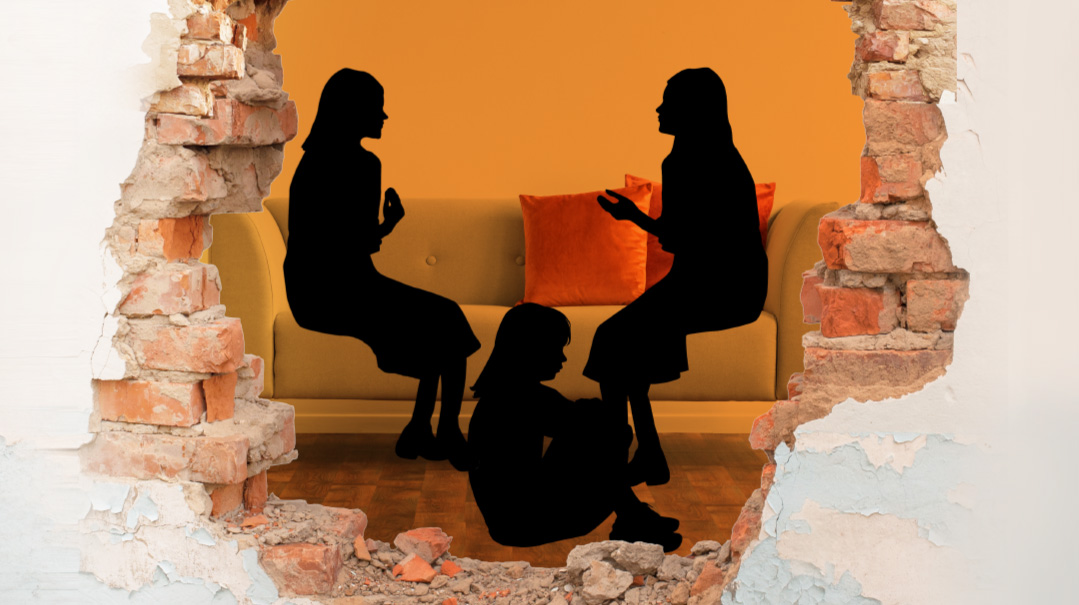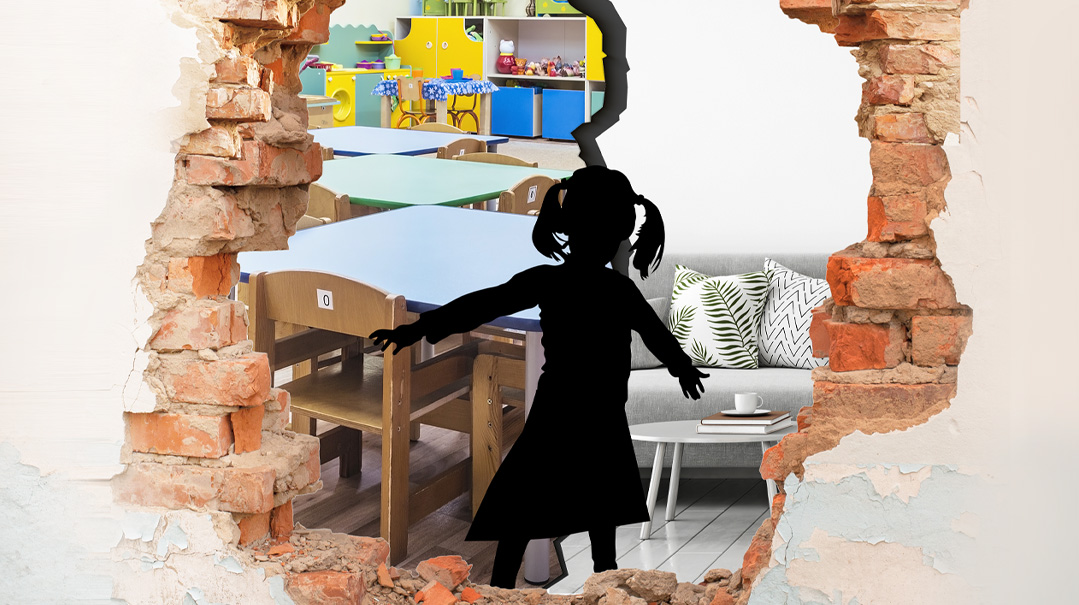The Invisible Grandmother Syndrome

Our children grow up and establish their own lives. This gives us joy and it gives us pain

Moderated by Faigy Peritzman
I'M the mother of a wonderful family, blessed with five daughters and two sons, kein ayin hara.
I had a wonderful time raising my kids. We had fun cooking, baking, and clocked in hours of schmoozing. Of course, I went through my share of regular hardships in child-rearing, but as the kids started getting older, the girls especially became like my close friends.
When they started getting married, they called to update me on everything that was going on in their homes and lives, and I reciprocated. We had a beautiful relationship.
Now that all five girls are married, a new dynamic has evolved. They’re extremely close with each other. They talk for hours on the phone, sometimes on a five-way conference call — but for some reason, I’m not part of that!
They text each other every morning, coordinate their schedules, catch up in the evenings with each other, but not with me. I know how busy their lives are, but I just want to touch base, to share a little bit, to schmooze, to be included.
Should I tell them how I feel? I feel like such a nebach to beg. Plus, I don’t want a forced relationship. Is a relationship with sisters that much more fulfilling than a relationship with a mother? Am I a has-been because I’m not at the same stage of life as them?
This whole situation has become so painful for me.
I try to keep busy so I don’t sit and mourn the past. I try to find fulfillment in other relationships and projects. Yet they all seem but an empty alternative to my real need for a relationship with my children.
Perhaps this is the reality of life. If so, how do I deal with it? As a mother for most of my life, I can’t seem to switch gears now and detach myself from them. And I’m not even sure I’m supposed to. Am I?
Dr. Ruchama Fund is a clinical psychologist with a special interest in coaching for effective dating, and in the treatment of Relationship-OCD as it effects shidduchim. In her private practice in Flatbush she treats adults with anxiety, OCD, ADHD, trauma, and relationship issues. Dr. Fund’s favorite modalities include EMDR, IFS, SP, DBT, and Positive Psychotherapy.
Icommend you for raising these questions, and for asking if your expectations are reasonable instead of just assuming they are. It’s quite common for parents to experience some version of what you’re going through. (And I’d emphasize that we need to question our expectations before assuming that we’re being wronged).
For many years, your daughters were your close friends. Now that they’re married, it seems they’re very close to each other, and you’re left out.
Your pain over the change in your relationship is great. It feels as if you’ve lost something very precious to you, something in which you’ve invested years of your life. You may feel lonely, hurt, abandoned, insignificant. And you may feel angry that you’re being treated unfairly.
You may also be wondering whether you did something wrong to cause this. Let’s be clear. This evolution in your relationship doesn’t in any way indicate faulty input on your part. Quite the opposite. Your tremendous closeness in their youth and your interest in them was very beneficial to them. It gave them confidence and helped them forge their independence. The fact that your daughters are close to each other is also a tribute to you.
Still, you wonder, is this normal? Is this the new reality of your life? Unfortunately for many, this does become the reality. I call it the Invisible Grandmother Syndrome. The grandmother is sitting at a full Shabbos table. The conversation is flying over her head, yet no one stops to explain what people are talking about or to include her in the conversation.
(I hope children read this and give their parents some attention, realizing that mothers cherish the relationships with their children and are sensitive to how they’re treated.)
But let’s focus on your end, on what can you do to avoid this scenario. Here are some tips:
Don’t depend on your daughters to fulfill your needs for companionship and identity.
Express pride in your daughters and convey to them your confidence in their ability to make decisions and to cope with life.
Don’t nag, demand, intrude, ask too many questions. Keep appropriate boundaries.
The source of most relationship problems is unreasonable expectations. Evaluate yours.
Make it easy for them to be respectful of you and toward you.
The most common complaint that adult daughters have of a mother is that she’s critical. Try to ensure that’s not the case with you.
Build a positive connection. Be supportive, empathize, validate. Accept that your children are adults. Don’t try to control them with overly strong opinions, unsolicited advice, or guilt. Give them space.
Strengthen the relationship with each daughter separately; do what you enjoy together.
Think about what you wanted from your mother when you were a young adult. Allow your memories of that time to enhance your empathy toward your daughters.
Remember, while you’re not on the same level as your daughters, you’re still their guide and role model. The relationship between a mother and daughter isn’t a casual one; the kavod toward a parent is its essence. It’s not a relationship of pals, of contemporaries. For that, your daughters turns to their sisters. Relationships with sisters and friends provide a bridge that enables the young person to make the scary move from childhood to adulthood. They need that connection.
Loss is an integral part of life. There are relationships, illusions, dependencies, and impossible expectations that all of us have to give up in order to grow or to allow others to grow.
These losses are a given, and we must accept them. Think, for example, about sending your child off to her first day of school. Walking your child down to the chuppah.
Our children grow up and establish their own lives. This gives us joy and it gives us pain. Acknowledge the pain and mourn the situation with acceptance and self-compassion. Think about the meaning of your life now. The meaning has changed. You’re sacrificing closeness for the sake of your daughters developing autonomy. Rejoice in the knowledge that this is a crucial development necessary for them to be successful adults.
I wish you what I’m sure you wish yourself: much nachas in watching your daughters develop into the adults they’re meant to be.
Rebbetzin Joanne Dove uses a wealth of experience, endless energy, and her vibrant personality in her role as a senior educator of SEED London.
Before I actually answer your question, I’d like to take a moment to validate what you’re feeling. As mothers, we give unconditionally for years, and we’re doing it simply because we are mothers, without any expectation of getting anything back (except in nachas).
Yet even so, perhaps you’re feeling unappreciated. Take a moment to focus on those feelings and understand them.
Let’s approach your question from a couple of different angles.
I’d like to share my personal experience. Our oldest two daughters are twins. At the first one’s chasunah, I was expecting my youngest child. I’d gone from making a bar mitzvah in June, to an engagement, and then to a wedding, walking down the aisle in maternity clothes.
My second daughter got engaged right after I gave birth, and seven weeks later, we made the second wedding. Nine months after that, I flew to Eretz Yisrael with my own baby to help make a shalom zachar and Shabbos bris for my oldest grandson. I rocked the newborn while feeding his uncle. Three months later, I was back in Eretz Yisrael to help with my next daughter’s birth.
For a while, despite the fact that my daughters were living in Eretz Yisrael, it seemed our lives were taking the same trajectory. Feedings, teething, etc. I still had a full household.
But slowly, everybody’s lives move on. My youngest grew up, and my house emptied out, while their homes began filling up, kein ayin hara. No longer were we sharing the same stage in life, my daughters and I. And knowing that different stages in life require shifts in the nurturing of our relationships made all the difference. I’d still speak with my daughters often. But if their husbands walked in while I was on the phone, we’d quickly finish our conversation, and I was happy about that. Husbands come first. We all have to understand where we stand in our children’s lives and recognize when our current position changes.
When our children are young, we’re so overwhelmed with the day-to-day upkeep, we don’t focus enough on our own peer friendships and interests. And then we turn around, find we’re no longer as busy with those tasks, but we don’t have the support and friendships we need to start branching out in this new stage of life.
We have different concerns than our married children have. Our kids are talking about buying Yom Tov clothing, trying to balance suppers and bedtimes, and we mothers are on a totally different plane. When we don’t have other interests to keep ourselves busy, we may find we focus on the little things that make us feel left out. Trying to hold on to that old dynamic, in which my daughters and I were a unit, isn’t beneficial to any of the parties. We’ll always be close, but we don’t have to be sharing the same daily routine.
Recently, my daughters (who have since moved back to England) went on a sisters’ day out to Paris. They didn’t invite me. I paused, thought that exclusion over — and was fine with it. Because this was sisters’ day. Not mine. There are things that mothers are there for and things sisters are there for. Which means I can expect to be included in the events we share, like birthdays, simchahs, etc.
There’s much we can do to nurture and build up our mother-daughter relationship so long as we recognize the relationship for what it is and is not. I try to take my girls out for breakfast or monthly salad meetings. They’re fabulous company. I try to focus on each one, on what she enjoys.
We develop a unique relationship with our grandchildren as well. What’s more enjoyable than Shabbos lunch with your grandchildren around? And through that, too, I’m connected to my children. I also make food for my married children, sending them over their favorite dishes.
We want our children to grow up into independent adults who don’t need us the way they used to. That can only develop if we don’t need them the way we used to as well. But the new and improved relationship can be just as fulfilling, as long as we’re sharing it together.
Wishing you much hatzlachah.
Mrs. Beryl Tritel, LMSW is a therapist in private practice, seeing clients in Ramat Beit Shemesh, Yerushalayim, and worldwide over Zoom. She is also the founder of Jewish Women Becoming Shalem, a free online forum.
IT sounds like you did a wonderful job raising your children, preparing them to raise their own families. I can also sense your pain.
You brought up two different issues, and I’d like to address both of them.
Regarding your daughters’ independence, of not needing your connection, the bigger issue here is feeling like a “has-been.” An essential part of your identity has changed. Your responsibilities have shifted. It’s not just that you’re not raising kids, but that everything that went along with that has ended as well. The housework, car pool, homework, after-school activities, and, most importantly, being known as “so and so’s mother.” Since this is no longer part of your life, it makes sense that you feel empty.
I believe the first step is trying to change how you see yourself. Take a look back at the various stages of your life. The things you were involved with as a teenager weren’t what busied you as a young married. What you were doing as a young married, you certainly weren’t doing when your kids were little, etc.
Yet evolving into the next stage didn’t prompt the feeling of being a “has-been.” Rather, you moved on to the next stage each time, because that’s what life is all about. Just like each new stage when you were younger was exciting, this can be true of things now.
You wrote that you don’t want to mourn the past, but maybe you should. Meaning, a very significant part of your life is no longer the same. That’s huge! Professionals say that making a job switch is one of the most stressful things in life, and this is exactly what you did! I’d encourage you to take some time to reflect on the job you’ve done so well. Grant yourself the space and time to address the sadness of letting go of that identity.
As you move past that, you need to figure out who you are. Take some time to think, perhaps journal or talk to a friend who has either gone through this already, or is in the process. Getting support and chizuk can do wonders for processing this kind of change.
While discovering this new self, try to figure out what you’d like to accomplish, not because your kids don’t need you as much, but rather because now is the time for you to develop yourself. It’s much more empowering when you’re moving toward a goal, rather than moving away from something.
Now, I’d like to address the second part of your question. It could very well be that you and daughters have a different definition of what “being close” means. You write about your “real need” for a relationship with your children. You may need to redefine what a relationship with your children is supposed to look like now. Your daughters have different needs, and it’s normal to seek out connection with others (especially sisters!) who are in the same stage of life. It isn’t that their relationship with each other is more fulfilling, but that it offers them something only a peer can give.
I don’t think your focus should be about “detaching” as much as it should be about “reattaching.” The relationship that your daughters have with you won’t be the same as it was, but it can still be different and fulfilling.
On a technical level, there are many things you can do to maintain a connection with your daughters in a natural way. I know some mothers have a Rosh Chodesh get-together with their daughters and daughters-in-law (could be lunch or dinner out, or something else fun).
I have another friend who has “Family Dinner Night” once a week. Once a week she sends out a message on the family chat announcing what time dinner is, what she’s making, and whoever can come is welcome. She says that some weeks everyone comes, some weeks it’s only a few people. Some weeks a couple may just come and get “takeout.”
Whatever the result, she’s conveying the message, “I’m here for you, I want to see you and connect with you.”
Do you have a situation in which you feel stuck or trapped?
Send a brief synopsis of the scenario to familyfirst@mishpacha.com.
(Originally featured in Family First, Issue 797)
Oops! We could not locate your form.







